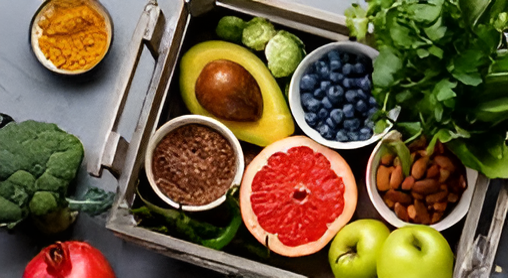Personal Development
Common Nutrition Myths You Need to Stop Believing

Common nutrition myths deceive most individuals and make healthy eating more complicated than it should be. In this blog post, we will address the most common nutrition myths and give reasons why they are untrue.
Myth 1: Carbs Make You Fat
Carbs are evil, but they don’t make you fat. Your body runs on carbohydrates. Fresh fruit, vegetables, and whole grains contain good complex carbs, which give you energy throughout the day. Cakes, candy, and bread with refined carbohydrates are what will make your blood sugar spike and then make you hungry sooner. Instead of avoiding carbs, enjoy good carbs, which will sustain you and supply energy.
Myth 2: Fat Is Always Bad
Everyone used to think years ago that consuming fat meant gaining fat. That led to the fat-free craze, foods, and snacks. But not all fats are created equal. Healthy fats are what your body requires to absorb vitamins, cushion organs, and feel full. Avocados, nuts, seeds, and olive oil have the good stuff—unsaturated fats. The naughty ones are trans fats (on packaged foods) and some saturated fats. Rather than eliminating fat entirely, be clever about fat and splurge in moderation.
Myth 3: You Need Protein Shakes to Build Muscle
Most people make a beeline to the store to buy protein powder as soon as they start exercising. Protein does repair and build muscle, but not necessarily that you need shakes every day. Most people get enough protein from regular meals. Chicken, fish, eggs, tofu, lentils are all high in protein. Other supplements accumulate as much as calories unless you’re a bodybuilder or professional athlete. Eat real food first.
Myth 4: Natural Sugar Is Always Better
Others think natural sugar—like honey, fruit juice, or agave—is always a good option. While fruits have fibre, vitamins, and antioxidants, natural sweeteners remain sugar. Having too much juice or too much of dates or raisins will increase your sugar level in seconds. Your body also reacts in the same manner to most of the sugars whether from honey or cane sugar. Have whole fruits rather than juices, and sweets in moderation.
Myth 5: Eating Late at Night Leads to Weight Gain
You’ve probably heard you’re going to gain weight if you eat past 8 p.m. That’s not the case. Your body doesn’t magically store extra fat at night. It’s what you’re eating and how much you’re eating. People who eat late at night are going to reach for the chips, the cookies, or the soda—high-fat, high-sugar foods. If you are consuming healthy food in correct proportions, then having food after midnight is fine. A banana or a yoghurt of small quantity won’t do you any harm.
Myth 6: Detox Diets Flush Out Toxins
Juice cleanses, cleanse teas, and “flat tummy” waters promise rapid results. Come on—your body doesn’t need help to detox. Your liver, kidneys, lungs, and digestive system do all that work for you daily. Detox diets starve your body of calories and essential nutrients. They can make you lose water weight, but you’ll be weak and regain it in a flash. Instead of seeking quick fixes, drink water, eat real food, and exercise.
Myth #7: Skipping Meals Gets You Thin
Skipping meals as a short-term solution to get thin really does make you gobble later. Skipping breakfast or lunch makes you hungrier and makes your body crave higher-calorie foods. You’re tired, lethargic, and irritable as well. Well-balanced regular meals with protein, fiber, and health fat keep your metabolism and blood sugars steady while you stay upbeat. Eat less not less smart.
Final Thoughts
Don’t let myths control your diet. Nutrition doesn’t have to be complicated, just complicated-sounding. Focus on whole food, balanced meals, and wise choices and you’ll become stronger, smarter, and healthier. Shut out the noise and trust facts, not fads. Your body is worth it.
Personal Development
Teach Your Kids About Healthy Eating and Nutrition in a Smart Way

It takes more than just providing healthy food to raise healthy children. Parents must educate children on why good food is important. Early nutrition education makes kids healthier food consumers for life. If you want your children to be healthy and happy, then talking to them about what’s on the plate is important.Nutrition does not have to be a boring topic for children, but it can be if parents make it so. When parents incorporate good eating into something fun and simple, kids will understand all the more. The following are simple and effective ways to teach your children about nutrition. From planning meals to grocery shopping, everything can be used as a learning tool.
1. Start Early with Simple Lessons
Children are easiest to teach through habits and repetition. So start teaching them about nutrition right from a very young age. Tell them that fruits, vegetables, whole grains, and proteins are what make the body strong and big. Tell them a story or cartoon character where they show healthy characters. Or simply use phrases like “superfoods” so that they are encouraged. Inform them that food gives energy to the body. Attempt to connect their favorite activities—like playing football or cycling—to the food that they eat. For example, say, “Carrots help your eyes see much better while running on the field.”
2. Be a Role Model in the Kitchen
Children imitate what they see. If you are consuming fruits and vegetables, your kids are more likely to experiment with them too. Prepare healthy dishes together. Let them wash vegetables, stir a soup, or do simple work. They’ll be happy with what they’ve done and willing to consume what they’ve worked on.
Explain your food choices while cooking. For example, say, “We are using olive oil because it’s healthier than butter.” Keep your words concise and clear. The goal is to incorporate nutrition into everyday life.
3. Use Games and Apps to Make Learning Fun
Children like games, and games are also a good way of learning new ideas. Many apps are designed to teach about nutrition through nice characters, tests, and stories. Utilize apps like “Food Heroes” or “MyPlate Kids.” These can turn learning into a fun activity. Create games at home. For example, make a “fruit and veggie” bingo board. Give points for trying new foods. Give a small reward for filling in the board. This is a fun way to get excitement while encouraging healthy eating.
4. Make Grocery Shopping a Learning Experience
The supermarket is the ideal place to teach children about food. Make them help choose fruits, read labels, and pick healthy snacks. Teach them to spot added sugars or too much sodium on food labels. Turn grocery shopping into a scavenger hunt. Ask them to find one red fruit, one green vegetable, and a healthy grain. This makes them more curious and helps them remember healthy foods. Talk about food origins, too. Say things like, “Where does milk come from?” or “How do apples grow?” These brief conversations create interest in food and how it processes inside the body.
5. Avoid Food Shaming and Guilt
It is fine to give children cookies or chips on the occasional occasion. The rule is balance, not perfection. Don’t call a food “bad.” Instead, refer to them as “sometimes foods” and “everyday foods.” This makes children understand that all foods may be part of a healthy diet, but in different groups.
Avoid using food as a reward or punishment. The sentence, “You can have dessert if you eat your vegetables,” turns the veggies into a chore. Share all foods with love and without stress.
6. Read Stories and Books About Healthy Eating
Reading with your children builds habits and sparks curiosity. The majority of picture books discuss nutrition in a straightforward and fun way. Titles such as “The Very Hungry Caterpillar” or “Eat Your Colors” show the benefits of eating fruit and vegetables. Once they have read, talk about the characters and what they eat for food. Ask questions like, “What do you think would happen if the caterpillar only ate candy?” This puts stories into perspective for children.
7. Keep Nutrition Discussions Positive and Encouraging
Children respond more positively when they feel encouraged. Praise healthy foods with positive comments. Comment like, for instance, “I’m proud of you for taking a bite of that broccoli!” Positive comments build confidence and motivation. If your kid doesn’t like healthy food, do not push it upon them. Offer it to them some other day, or cook it differently. It may take 10–15 attempts before kids embrace new foods.
8. Teach Through Routine and Repetition
Establish nutrition as a daily routine. Start each day with a healthy breakfast. Talk about food consumption and why it is healthy for the body. At night time, inquire about children’s favorite vegetable or fruit for the day. Make Sunday meal preparation a family affair. Let children help plan lunches for the week. The more involvement, the better they will comply with healthy eating.
Teaching your children about nutrition is not an exercise you do once; it’s an ongoing process.
It’s the combined effect of small day-to-day experiences that add up to mean a great deal. By being a role model, employing interactive tools, and remaining positive in speech, you can make your child have an enduring affinity for healthy food.Remember, the goal is not perfection—it’s progress. Start small. Stay consistent. And most of all, enjoy the journey together.
Mind & Soul
Happy Life, Happy You: 7 Easy Ways to Feel Joy Every Day

We all want to be happy, but we do not know where to start. We think that happiness lies in money, success, or fame, but true happiness usually comes from the little things we do daily It is not about having a perfect life but about getting used to being contented with the life you already have. If you want to have greater peace and happiness in your life, these simple habits can help you feel better on the inside and outside.
1. Start Each Day with Gratitude and a Positive Thought
If you begin your day with thoughts of what you’re thankful for, the whole mood in you changes. Gratitude trains your mind to think positively of what you have instead of dwelling on what you don’t have. This can be anything as basic as having breakfast, the weather, or a friendly note from someone. The more you embrace gratitude, the more it becomes second nature to be content with life.
2. Spend Time with People That Make You Happy
The people you spend time with have the ability to lift you up or bring you down, so choose wisely. Spend time with family or friends that make you laugh, feel safe, and accepted. Good conversations, smiles, and support can make even tough days a little less hurtful and remind you that you’re not on your own.
3. Build Little Achievements That Celebrate You
When there is something to be anticipated, life is more exciting and meaningful. It doesn’t have to be an enormous ambition—it could be gaining a new skill, performing better academically, or reading more books. The accomplishment of even a small ambition brings more self-assurance, and each victory contributes to overall happiness.
4. Spend Time Outdoors and Utilize Nature Every Day
Spending time outdoors calms your mind and lightens the load on your heart. A ten-minute stroll outside can soothe stress and rejuvenate your perspective. Take a walk around the block, sit in the shade of a tree, or look at clouds. Nature’s gentle power lifts your mood without anyone uttering a word.
5. Get Healthy with Rest, Exercise, and Great Food
Your body’s physical health is a large part of how satisfied you are. When you eat healthy foods, drink water, take care of yourself through exercise, and sleep soundly, your energy increases. When your body’s empty and tired, it is harder to feel good emotionally. Treat your body well—only one to go around.
6. Be Nice to Other People Without Hoping Something in Return
Treating someone else kindly can make you joyful, too. Whether you assist a friend, smile at a stranger, or give them something you have, kindness puts people in a good mood. Paying it forward gets you closer and makes your day worthwhile.
7. Remain Present and Cease Comparing Your Life
The majority of unhappiness arises from focusing too much on the past and future or comparing oneself with others. Rather, make an effort to appreciate what is happening now. Pay attention to what you hear, see, and feel. There is something lovely in every day—you have to slow down and notice it.
Conclusion
Happiness is not just something that happens—it’s something you build through living your life. It’s a chain of little, daily habits such as good relationships, gratitude, getting enough rest, and being kind that makes a big difference. You don’t need a flawless life in order to be happy. You must build space for peace, purpose, and love into your day.
Personal Development
Distractions Don’t Win: Easy Daily Habits to Stay Focused

It’s easy to get distracted during the day. Your phone lights up. Someone calls out to you. You recall something ridiculous on YouTube. These little things throw off your focus. When this happens over and over, you get less done and feel even more drained. But fear not—there are simple ways to fight distractions and stay focused. In this blog post, you will learn easy yet effective tips that help you take back control of your mind and time.
1. Start With a Clear Plan
Spend five minutes before you do anything else laying out your day. Write down your most important tasks first. Then, write down the smaller things you need to do. This provides purpose to your brain and keeps you on track and organized. Without a plan, you will end up lost and flitting from one thing to another. That wastes energy and time. A specific plan is like a map—it shows where you are headed and keeps you on track for the destination.
2. Turn Off Notifications
Reminders distract you immediately. One ping, and your focus is broken. That tiny reminder could take five minutes or so to appear. So, turn off reminders while working or studying. You can check them at scheduled breaks. This prevents your brain from switching frequently. Switching constantly is bad for concentration and memory. Silence your phone or use “Do Not Disturb” mode. You’ll notice a tremendous difference in how much you accomplish.
3. Use a Timer to Stay on Track
Timers make you stay awake without making you exhausted. The Pomodoro technique is a great way to try it out. Work for 25 minutes and take a 5-minute break. Take a longer break after four sets. This strategy sharpens your mind and prevents burnout. Timers add a little bit of pressure as well, which can be helpful to boost concentration. Since you know there’s a break coming up, it’s easier to stay focused despite distractions and work.
4. Assign a Distraction-Free Zone
Your workspace matters. If cluttered or filled with toys and fun things, your brain will get distracted. Make your space clean, quiet, and simple. Put away toys, phones, and other distractions. Sit in one location every day. This makes your brain know it’s time to focus. Over time, your brain will go into “work mode” earlier when you’re sitting in that spot.
5. Take Smart Breaks
Breaks aren’t time wasters—they help you recharge your brain. Take a break each hour. Stretch, walk, get a drink of water, or breathe. Avoid screens during your break, especially social media. This refreshes your brain and body. When you return to work, you will be more energized and focused. Failing to take breaks will leave you exhausted and stressed, leading to more mistakes and less productive work.
6. Set Boundaries With the People Around You
If you have others around you at work or in your living space, let them know when it is your concentration time. Ask them politely not to disturb you unless it is an emergency. You can actually put up a “Do Not Disturb” sign. This lets people give you respect for your time and space. If people know you mean it, they will bother you less. Clear communication keeps everyone happy and lets you stay focused.
7. Have a Distraction List
Sometimes an idea might occur to you in the middle of work. It may be a reminder or a thought. Instead of answering it at once, can you note it down in a notebook or application? That way, you won’t forget it, and it won’t interrupt your focus. You can go over your list after you’ve finished your main task. This little trick makes you sane, decluttered, and focused.
Distractions are everywhere, but you don’t have to let them win. With these small tweaks, you can be the master of your day. Plan out your tasks, protect your time, and power your brain to stay sharp. Being focused isn’t about being perfect—it’s about building good habits every day. Use these tips, and you’ll be getting more done and stressing less.
-

 Healthy food4 weeks ago
Healthy food4 weeks agoHealthy Vegan: Fact vs. Fiction
-

 Healthy food3 weeks ago
Healthy food3 weeks agoChia Seeds: Tiny Grains With Giant Power
-

 Mind & Soul3 weeks ago
Mind & Soul3 weeks agoThe One-Minute Calm: How Breathing Can Change Everything!
-

 Healthy food2 weeks ago
Healthy food2 weeks agoFood to Fight Depression and Anxiety: What to Eat to Feel Better
-

 Personal Development2 weeks ago
Personal Development2 weeks agoSchedule Overload: How to Handle a Busy Life Like a Pro
-

 Mind & Soul3 weeks ago
Mind & Soul3 weeks agoUnderstanding Anxiety: A Guide to the Different Types
-

 Mind & Soul3 weeks ago
Mind & Soul3 weeks agoDistance Isn’t the End: 10 Ways to Keep Your Love Alive
-

 Body and Health3 weeks ago
Body and Health3 weeks ago8 Diabetes Myths You Shouldn’t Believe


























